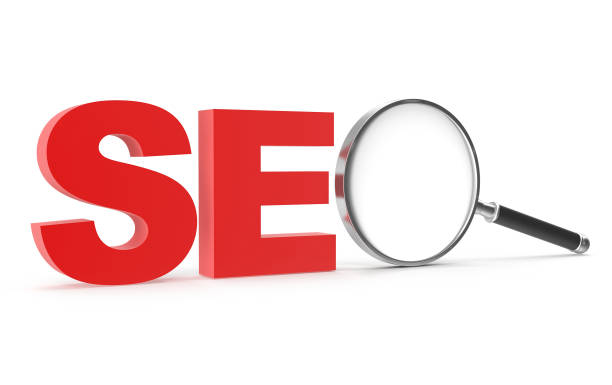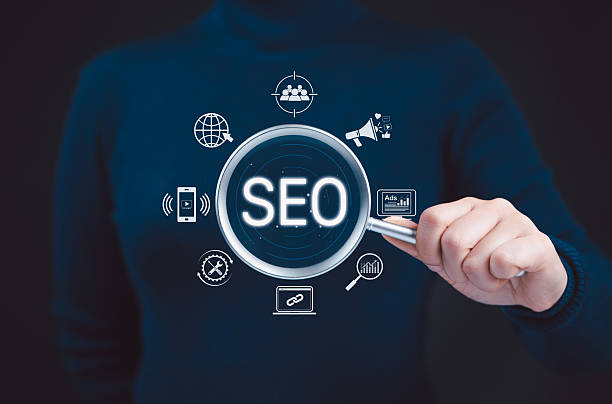What is Off-Page SEO? Definitions and Basic Concepts

Off-Page SEO refers to a set of activities and actions that take place outside of your website and aim to improve the site’s ranking in search engines like Google.
In fact, Off-Page SEO shows search engines that your website is credible, reliable, and valuable.
This credibility is achieved through various factors such as link building, social media presence, branding, and content marketing.
In contrast to #On_Page_SEO, which focuses on optimizing website content and structure, Off-Page SEO focuses on building credibility and reputation for your website on the internet.
A successful #SEO strategy includes a combination of both types of SEO.
Off-Page SEO is a continuous and dynamic process that requires consistent effort and follow-up.
However, investing in Off-Page SEO can bring long-term and sustainable results for your business.
The importance of Off-Page SEO is that search engines use it as a signal to determine the quality and value of a website.
A website with high-quality and credible incoming links is more likely to rank higher in search results.
In short, Off-Page SEO helps build credibility and reputation for your website on the internet, which leads to improved site ranking in search engines and increased traffic.
Is your online store ready to attract maximum customers and increase sales? Rasaweb transforms your online business with modern and efficient online store designs.
✅ Increased speed and improved SEO
✅ Excellent user experience on mobile and desktop⚡ Get a free consultation on online store website design from Rasaweb!
Importance and Impact of Off-Page SEO on Site Ranking

Off-Page SEO plays a very important role in the ranking of websites in search engines.
Search engines like Google use complex algorithms to rank web pages, considering numerous factors.
One of the most important of these factors is the credibility and reputation of a website, which Off-Page SEO directly impacts.
When other websites link to your website (backlinks), this is considered a vote of confidence in your website.
The greater the number and quality of these backlinks, the higher the credibility of your website in the eyes of search engines, and as a result, you will achieve a better ranking in search results.
Off-Page SEO is not just limited to getting backlinks.
For example, if a reputable and high-traffic website links to a specific page on your website, this link can have a significant impact on the ranking of that page.
Conversely, getting links from low-quality and spam websites is not only useless but may also harm your website’s ranking.
Therefore, to improve your website’s ranking, you should pay special attention to Off-Page SEO and develop a suitable strategy for link building and increasing the credibility of your website.
This strategy should include producing high-quality content, actively participating in social networks, and interacting with other websites and influential people in your field.
Off-Page SEO, as a key factor in website ranking, plays a very important role in the online success of your business.
By investing in Off-Page SEO, you can improve your website’s ranking in search engines, attract more traffic, and ultimately increase your sales and profits.
Off-Page SEO boosts your business.
Key Off-Page SEO Strategies for Improving Ranking

To improve your website’s ranking in search engines through Off-Page SEO, you can use various strategies.
Some of the most important of these strategies include:
Link Building: Creating high-quality incoming links (backlinks) from other websites.
This shows search engines that your website is credible and valuable.
Content Marketing: Producing high-quality and engaging content that is shared by others.
This helps increase awareness of your brand and attract incoming links.
Social Media Presence: Being active on social networks and sharing your website’s content.
This helps increase website traffic and engagement with your audience.
Branding: Creating a strong and credible brand that is recognized by others.
This helps increase trust in your website and attract incoming links.
Online Public Relations: Establishing relationships with journalists and bloggers and trying to publish news and articles related to your business in online media.
Building Credibility: Striving to gain credibility and reputation in your field.
This can be done by participating in conferences, publishing specialized articles, and providing high-quality services.
Monitoring and Follow-up: Monitoring the performance of Off-Page SEO and following up on its results.
This helps you improve your strategy and achieve better results.
Choosing the right strategy depends on various factors such as the type of business, the field of activity, and your budget.
However, it is recommended that you use a combination of different strategies to achieve better results.
In the following, we will examine each of these strategies in more detail:
| Backlink Type | Description | Impact on Off-Page SEO |
|---|---|---|
| Editorial Backlinks | Links given to your website naturally because of the quality of your content. | Very High |
| Profile Backlinks | Links created in user profiles on other websites. | Medium (depending on website credibility) |
| Comment Backlinks | Links placed in the comment sections of websites. | Low (usually nofollow) |
Link Building; The Most Important Pillar of Off-Page SEO

Link building is one of the most important pillars of Off-Page SEO and refers to the process of creating incoming links (backlinks) from other websites to your website.
These links show search engines that your website is credible, reliable, and valuable.
The higher the number and quality of your website’s backlinks, the better the ranking you will achieve in search results.
For successful link building, you should pay attention to the following points:
Link Quality: Getting links from reputable websites related to your field will have a much greater impact on your website’s ranking than getting links from low-quality and spam websites.
Link Diversity: Getting links from various sources (such as blogs, news media, social networks, and directories) shows search engines that your website is attractive to different audiences.
Link Placement: Links that are placed inside the main text of a page will have a greater impact on your website’s ranking than links that are placed in the footer or sidebar of a page.
Number of Links: Although the quality of links is more important than their number, a large number of links can also have a positive impact on your website’s ranking.
However, you should avoid excessive and unnatural link building.
Link Building Speed: Link building should be done gradually and naturally.
A sudden increase in the number of links may cause suspicion from search engines.
Off-Page SEO, if not done properly, is not only useless but also harmful.
In general, link building should be considered as a long-term and continuous strategy.
With consistent effort and follow-up, you can create high-quality incoming links for your website and improve its ranking in search engines.
Off-Page SEO, in essence, greatly helps your site’s ranking.
How much does losing business leads due to an unprofessional site cost you? Solve this problem forever with Rasaweb’s professional corporate website design!
✅ Increase the credibility and trust of potential customers
✅ Easier to attract new business leads
⚡ Get a free consultation right now!
Social Networks and Their Role in Off-Page SEO

Social networks play an important role in Off-Page SEO.
Although social network links do not directly affect website ranking in search engines, they can help increase brand awareness, attract traffic, and engage with the audience.
Being active on social networks and sharing your website’s content can help increase your website’s traffic and attract new audiences.
Also, social networks can be used as a communication channel to interact with the audience and answer their questions.
To effectively use social networks in Off-Page SEO, you should pay attention to the following points:
Choosing the Right Social Networks: You should choose social networks where your target audience is present.
Producing Engaging and Relevant Content: You should share content on social networks that is engaging and relevant to your audience.
Engaging with the Audience: You should engage with your audience on social networks and answer their questions.
Using Hashtags: You should use hashtags related to your field so that your content is seen by more audiences.
Analyzing Results: You should analyze the results of your activities on social networks and improve your strategy based on them.
In general, social networks can be used as a powerful tool to increase brand awareness, attract traffic, and engage with the audience.
By using social networks correctly, you can improve your website’s Off-Page SEO and increase its ranking in search engines.
Off-Page SEO is easily done with the help of social networks.
Content Marketing and its Impact on Off-Page SEO
![]()
Content marketing is another important Off-Page SEO strategy.
Producing high-quality and engaging content that is shared by others can help increase awareness of your brand, attract incoming links, and increase your website traffic.
For successful content marketing, you should pay attention to the following points:
Knowing the Target Audience: You should know your target audience and produce content that is engaging and relevant to them.
Producing High-Quality and Valuable Content: You should produce content that is valuable to your audience and helps them solve their problems or gain new information.
Optimizing Content for Search Engines: You should optimize your content for search engines to rank higher in search results.
Promoting Content: You should promote your content on social networks, email, and other communication channels.
Measuring Results: You should measure the results of your content marketing and improve your strategy based on them.
In general, content marketing can be used as a long-term and effective strategy to improve your website’s Off-Page SEO.
By producing high-quality and engaging content, you can increase awareness of your brand, attract more incoming links, and increase your website traffic.
Off-Page SEO requires producing useful and engaging content.
Practical Tools in Off-Page SEO for Analysis and Review

To analyze and review your website’s Off-Page SEO, you can use various tools.
Some of these tools include:
Ahrefs: A powerful tool for analyzing backlinks, keywords, and competitors.
Moz: A comprehensive tool for SEO that includes tools for analyzing backlinks, keywords, and ranking.
SEMrush: A powerful tool for analyzing keywords, competitors, and website traffic.
Google Search Console: A free tool from Google for checking website performance in search results.
Google Analytics: A free tool from Google for analyzing website traffic.
By using these tools, you can gain useful information about backlinks, keywords, competitors, and your website’s traffic and improve your Off-Page SEO strategy based on it.
Off-Page SEO is difficult and time-consuming without the use of analysis tools.
| Tool | Key Features | Price |
|---|---|---|
| Ahrefs | Backlink analysis, keyword analysis, competitor analysis | Monthly subscription |
| SEMrush | Keyword analysis, competitor analysis, traffic analysis | Monthly subscription |
| Moz Pro | Backlink analysis, keyword analysis, ranking | Monthly subscription |
Common Mistakes in Off-Page SEO and How to Avoid Them

In Off-Page SEO, mistakes may occur that can harm your website’s ranking.
Some of these common mistakes include:
Excessive and Unnatural Link Building: Link building should be done gradually and naturally.
A sudden increase in the number of links may cause suspicion from search engines.
Getting Links from Low-Quality and Spam Websites: Getting links from low-quality and spam websites is not only useless but may also harm your website’s ranking.
Not Paying Attention to Content Quality: Producing low-quality and non-valuable content can cause audiences to become discouraged from your website and attract fewer incoming links.
Ignoring Social Networks: Not being active on social networks can cause you to miss many opportunities to increase brand awareness, attract traffic, and engage with the audience.
Not Monitoring and Following Up: Not monitoring the performance of Off-Page SEO and following up on its results can prevent you from properly improving your strategy and achieving the desired results.
To avoid these mistakes, you should pay attention to the following points:
Careful Planning: Before starting Off-Page SEO activities, develop a careful and comprehensive plan.
Attention to Quality: Pay special attention to the quality of your links and content.
Use of Analysis Tools: Use analysis tools to check the performance of your Off-Page SEO.
Continuous Updates: Continuously update your Off-Page SEO strategy.
By following these tips, you can avoid common mistakes in Off-Page SEO and improve your website’s ranking in search engines.
Off-Page SEO requires patience and accuracy.
Are you losing business opportunities because of an old website? With Rasaweb, solve the problem of not attracting potential customers through your website forever!
✅ Attract more high-quality leads
✅ Increase brand credibility in the eyes of customers
⚡ Get a free consultation on corporate website design
The Future of Off-Page SEO; Changes and Predictions
![]()
Off-Page SEO is a dynamic and changing field.
With the advancement of technology and changes in search engine algorithms, Off-Page SEO strategies must also be updated.
Some of the important changes and predictions about the future of Off-Page SEO include:
Greater Importance of User Experience: Search engines are increasingly emphasizing user experience.
Websites that offer a better user experience are more likely to rank higher in search results.
The More Prominent Role of Artificial Intelligence: Artificial intelligence is changing the way search engines work.
Using artificial intelligence in Off-Page SEO can help improve performance and increase efficiency.
The Importance of Video Marketing: Video marketing has become an important strategy in Off-Page SEO.
Engaging and high-quality videos can help increase brand awareness, attract traffic, and engage with the audience.
Greater Impact of Branding: Branding has become an important factor in Off-Page SEO.
Websites that have a strong and credible brand are more likely to rank higher in search results.
Off-Page SEO is constantly evolving.
To succeed in Off-Page SEO in the future, you should pay attention to these changes and predictions and update your strategy accordingly.
Off-Page SEO is entering a new era of technology.
Summary and Final Points on Off-Page SEO

Off-Page SEO is an important strategy for improving website ranking in search engines.
By using various Off-Page SEO strategies such as link building, content marketing, social media presence, and branding, you can increase the credibility and reputation of your website on the internet and improve its ranking in search results.
To succeed in Off-Page SEO, you should pay attention to the following points:
Careful Planning: Before starting Off-Page SEO activities, develop a careful and comprehensive plan.
Attention to Quality: Pay special attention to the quality of your links and content.
Use of Analysis Tools: Use analysis tools to check the performance of your Off-Page SEO.
Continuous Updates: Continuously update your Off-Page SEO strategy.
Patience and Persistence: Off-Page SEO is a time-consuming process and requires patience and persistence.
By following these tips, you can improve your website’s ranking in search engines and achieve your marketing goals.
Off-Page SEO is a long-term investment.
Frequently Asked Questions
| Row | Question | Answer |
|---|---|---|
| 1 | What is Off-Page SEO? | Off-Page SEO refers to a set of actions that are performed outside of your website to improve its ranking in search engines. These actions include building backlinks, social media presence, branding, etc. |
| 2 | Why is Off-Page SEO so important? | Off-Page SEO shows search engines that your website is credible, popular, and trustworthy. Quality backlinks from reputable sites are a strong signal for better ranking and help increase your domain authority. |
| 3 | What are the most important components of Off-Page SEO? | The most important components of Off-Page SEO include: Link Building, Content Marketing, Social Media Marketing, Influencer Marketing, and Online Reputation Management. |
| 4 | What is a backlink and why is it important for Off-Page SEO? | A backlink is a link from another website that points to your website. These links act as a “vote of confidence” in Google’s eyes and indicate the credibility of your content. The more and higher the quality of backlinks, the better your site will rank. |
| 5 | What types of backlinks are most influential on SEO? | The two main types of backlinks are DoFollow and NoFollow. DoFollow backlinks pass authority (Link Juice) and directly affect ranking. NoFollows do not pass authority but can still drive traffic and help make the link profile look natural. (Also UGC and Sponsored) |
| 6 | How can I create quality backlinks for my site? | To build quality backlinks, you can use methods such as: producing great and shareable content, guest posting on relevant and reputable sites, broken link building, digital PR, and analyzing competitor backlinks. |
| 7 | What are Toxic Backlinks and how do they affect a site? | Toxic or spam backlinks are links that point to your site from low-quality, spammy, or irrelevant websites. These backlinks can harm your site’s ranking and even lead to penalties by Google’s algorithms. |
| 8 | What is the role of social networks in Off-Page SEO? | Although social signals (likes, shares, etc.) are not direct ranking factors, they help Off-Page SEO. They increase content visibility, increase direct traffic to the site, and ultimately increase the chances of gaining natural backlinks and improving brand awareness. |
| 9 | What is the importance of diversity in the backlink profile? | Diversity in the backlink profile means that your links come from a variety of sources (blogs, forums, news sites, directories), with diverse anchor texts, and with a combination of DoFollow and NoFollow links. This diversity shows Google that your link building is natural and organic. |
| 10 | What are common mistakes in Off-Page SEO that should be avoided? | Common mistakes include: buying backlinks in bulk and from low-quality sources, over-linking with target keywords (Over-optimization), ignoring quality in favor of quantity in backlink building, lack of diversity in the link profile, and ignoring harmful backlinks and not Disavowing them. |
And other services of Rasa Web Advertising Agency in the field of advertising
Intelligent Customer Journey Map: A fast and efficient solution to increase site visits by focusing on optimizing key pages.
Intelligent Conversion Rate Optimization: Transform SEO ranking with the help of custom programming.
Intelligent Reportage: A novel service to increase SEO ranking through optimizing key pages.
Intelligent Link Building: Professional optimization for online growth using Google Ads management.
Intelligent Social Media: Transform customer behavior analysis with the help of intelligent data analysis.
And more than hundreds of other services in the field of internet advertising, advertising consulting and organizational solutions
Internet Advertising | Advertising Strategy | Reportage Ad
Resources
What is Off-Page SEO? Comprehensive Off-Page SEO Training – SEO Iran
,Off-Page SEO: The Complete Guide in 2024 – Semrush
,Off-Page SEO: How To Get Backlinks & Rank Higher – HubSpot
,Off-Page SEO: What It Is, Why It’s Important & How To Do It
? To promote your business in the digital world and reach the peak of success, Rasa Web Digital Marketing Agency is always with you by providing services such as custom website design, SEO and content marketing.
📍 Tehran, Mirdamad Street, next to the Central Bank, South Kazerun Alley, Ramin Alley No. 6




